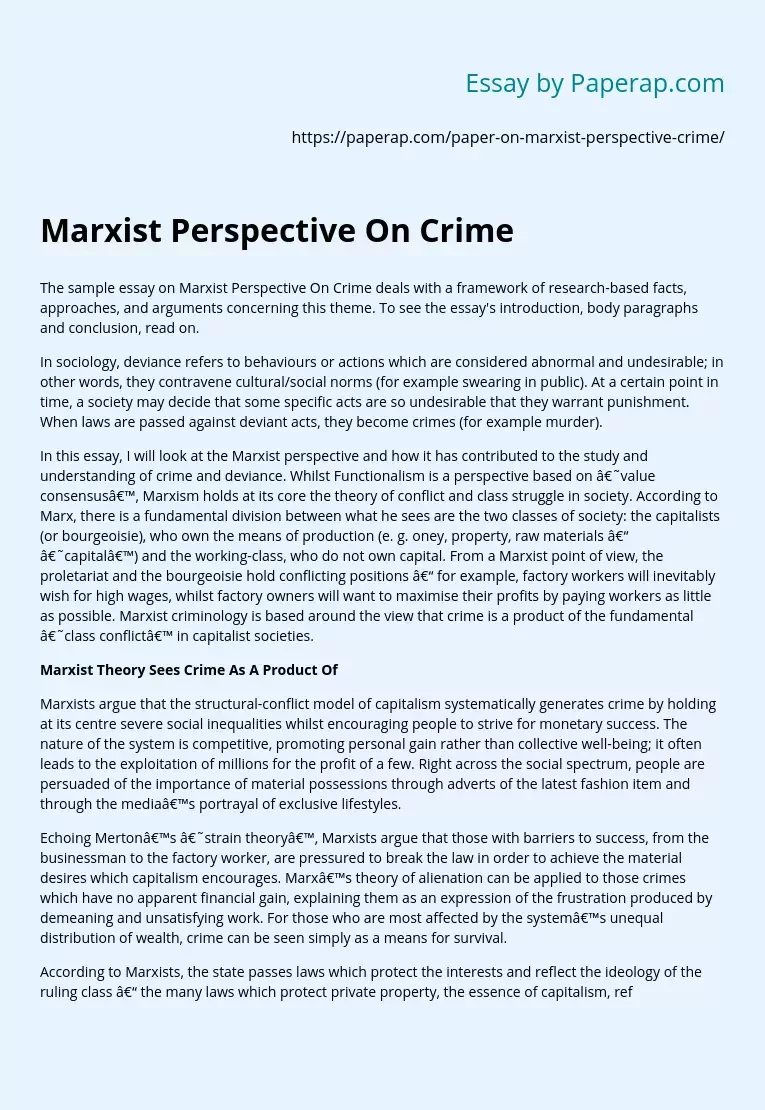Marxist Perspective On Crime
The sample essay on Marxist Perspective On Crime deals with a framework of research-based facts, approaches, and arguments concerning this theme. To see the essay’s introduction, body paragraphs and conclusion, read on.
In sociology, deviance refers to behaviours or actions which are considered abnormal and undesirable; in other words, they contravene cultural/social norms (for example swearing in public). At a certain point in time, a society may decide that some specific acts are so undesirable that they warrant punishment.
When laws are passed against deviant acts, they become crimes (for example murder).
In this essay, I will look at the Marxist perspective and how it has contributed to the study and understanding of crime and deviance. Whilst Functionalism is a perspective based on ‘value consensus’, Marxism holds at its core the theory of conflict and class struggle in society. According to Marx, there is a fundamental division between what he sees are the two classes of society: the capitalists (or bourgeoisie), who own the means of production (e.
g. oney, property, raw materials – ‘capital’) and the working-class, who do not own capital. From a Marxist point of view, the proletariat and the bourgeoisie hold conflicting positions – for example, factory workers will inevitably wish for high wages, whilst factory owners will want to maximise their profits by paying workers as little as possible. Marxist criminology is based around the view that crime is a product of the fundamental ‘class conflict’ in capitalist societies.
Marxist Theory Sees Crime As A Product Of
Marxists argue that the structural-conflict model of capitalism systematically generates crime by holding at its centre severe social inequalities whilst encouraging people to strive for monetary success.
The nature of the system is competitive, promoting personal gain rather than collective well-being; it often leads to the exploitation of millions for the profit of a few. Right across the social spectrum, people are persuaded of the importance of material possessions through adverts of the latest fashion item and through the media’s portrayal of exclusive lifestyles.
Echoing Merton’s ‘strain theory’, Marxists argue that those with barriers to success, from the businessman to the factory worker, are pressured to break the law in order to achieve the material desires which capitalism encourages. Marx’s theory of alienation can be applied to those crimes which have no apparent financial gain, explaining them as an expression of the frustration produced by demeaning and unsatisfying work. For those who are most affected by the system’s unequal distribution of wealth, crime can be seen simply as a means for survival.
According to Marxists, the state passes laws which protect the interests and reflect the ideology of the ruling class – the many laws which protect private property, the essence of capitalism, reflect the expansion of business and trade. They argue that laws which appear to be in the interest of the subject class are in fact just concessions and are there to create a ‘false consciousness’, an illusion of equality; they are in place to maintain the power of the ruling class and to keep the subject class under control.
From a Marxist point of view, there is a systematic bias in favour of those at the top, and this is evident when looking at how laws are enforced. ‘White-collar’ crimes, such as corporate/financial frauds, are rarely discovered and even more rarely prosecuted, despite the fact that they can have devastating effects; on the other hand, more visible ‘street crimes’ are severely punished by the agents of social control.
Moreover, people have unequal access to a fair trial – having the money to pay for a good lawyer can mean the difference between being found guilty or not guilty. In this light, Marxists play down the significance of official statistics, which predominantly record ‘blue-collar’ crimes, claiming that they are a social construction and that they do not reflect the truth. Radical criminology, a strand of neo-Marxism, developed in the 1970s through the work of Ian Taylor, Paul Walton and Jock Young as an alternative perspective to traditional Marxist criminology.
Like traditional Marxists, they see the economy as the most important part of society and they believe that the inequalities in wealth and power between individuals in capitalist societies are the root cause of crime. However, unlike Marxists, they reject theories suggesting that external forces can direct human behaviour (for example the strain to anomie). Taylor et al insist that crimes are often deliberate acts with political motives, and that deviants are not just the passive victims of capitalism, but that they are actively fighting and trying to alter capitalism.
By looking at the state’s role in the process of criminalisation, radical criminology draws both on Marxism and Interactionism in an attempt to produce a ‘fully social theory of deviance’. However, it has been criticised for failing to provide any substantial theories of crime and for offering a utopian socialist model as an alternative to capitalism. New left realism developed in the early 1980s both to compensate for some of the weaknesses of previous Marxist and neo-Marxist theories and to respond to a rise in ‘zero tolerance’ right-wing policies.
Left realists differentiate themselves from Marxists and left idealists by emphasising the significance of working-class street crime and by studying its effect on its victims. John Lea and Jock Young point to evidence from the British Crime Survey that there has been a massive increase in street crime since the Second World War. Whilst agreeing that crime is closely linked to deprivation, they reject the view that poverty is directly responsible for crime, arguing that unemployment levels in the 1930s were high, yet the crime rate was low compared to the 1980s.
Their explanation of crime is based around the concepts of ‘relative deprivation’, ‘subculture’ and ‘marginalisation’. According to Lea and Young, deprivation leads to crime when experienced as relative deprivation. When one feels deprived compared to someone else, they may use illegal means to feel less disadvantaged. As well as explaining property and financial crime, relative deprivation can be used to explain violent crime: relative deprivation can create frustration and aggression.
The concept of subculture is explained by Lea and Young as a collective response to a group’s problem. If a group sufferers from relative deprivation, it may adopt a lifestyle which to cope with their problem, either illegally or legally. The concept of marginalisation refers to groups at the margins of society, those without socio-political representation and clearly defined objectives. Typically, unemployed youths of minority ethnic groups resort to crime as an expression of their resentment to a society which doesn’t offer them anything.
Essentially, left realism is criticised for failing to explain the causes of crime – it relies extensively on victimisation statistics and only takes into account the views of victims on certain issues. Also, left realism fails to explain why some people who suffer from relative deprivation commit crime and others do not. However, it has highlighted the importance of understanding street crime and has influenced crime tackling policies. The traditional Marxist perspective on crime has been essential in illustrating the many flaws of capitalism and pointing out that crime is not exclusively a working class phenomenon.
In many respects, however, it has a rather simplistic view on the relations of power in capitalist societies. Moreover, it is in large part race and gender blind, and it emphasises the significance of corporate crime at the expense of other crimes. Most importantly of all, perhaps, it wrongly assumes that a communist system would eliminate crime. Despite these criticisms, Marxism has produced a basis for the understanding of crime and has influenced numerous new approaches which further enrich the study of crime and deviance.
Marxist Perspective On Crime. (2019, Dec 06). Retrieved from https://paperap.com/paper-on-marxist-perspective-crime/

